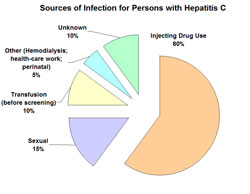
Subscribe & Follow
Advertise your job vacancies
Drug cocktail offers new hope for hepatitis C patients
A three-drug cocktail can eliminate the hepatitis C virus in patients far more effectively than the current two-drug regimen, according to researchers at Henry Ford Hospital.
"This study represents a remarkable advance and a potential cure for people with hepatitis C who have not responded to previous therapy," says co-author Stuart C. Gordon, M.D., section chief for the Division of Hepatology at Henry Ford Hospital.
"We will soon have a new standard of treatment for hepatitis C patients," says Dr. Gordon. "This study ushers in a new era of drug development that will provide a host of antiviral agents to treat hepatitis C, and we are now witnessing dramatic and rapid advances in how we will be able to treat these patients."
The results of the global study are in the March 31 issue of The New England Journal of Medicine.
Potentially a killer
At least 3.2 million Americans are infected with hepatitis C, a chronic viral disease affecting the liver. The Centres for Disease Control and Prevention estimates that more than 12 000 people die each year of liver disease and liver cancer associated with the hepatitis C virus.
Most people who are infected with hepatitis C remain without symptoms for years. When symptoms of advanced liver disease do occur, it is often too late to offer the current treatment regimens. The infection may lead to scarring of the liver (cirrhosis), liver cancer, or the need for liver transplant.
The virus was previously spread through contact with infected blood products before 1990, and often via injection drug use or the sharing of straws during the use of cocaine. Among immigrants to the US from Asian, African, Middle Eastern and Eastern European countries, the virus may have been transmitted via the use of non-sterile glass syringes used for vaccination purposes.
There is currently no vaccine for hepatitis C.
Results
In the study, researchers randomly assigned patients to one of three groups. In all three groups, patients received peginterferon and ribavirin (the current standard of care) for four weeks. A control group (group 1) continued to receive only peginterferon-ribavirin for 44 additional weeks; group 2 received boceprevir plus peginterferon-ribavirin for 32 weeks, and patients with a detectable hepatitis C virus level at treatment week 8 received placebo plus peginterferon-ribavirin for an additional 12 weeks; and group 3 received boceprevir plus peginterferon-ribavirin for 44 weeks.
Boceprevir is a protease inhibitor, a new class of direct-acting antiviral agent that specifically targets and inhibits the replication of the hepatitis C virus.
Results showed the rate of sustained virologic response (loss of the virus) was significantly higher in the two boceprevir groups (group 2, 59%; group 3, 66%) than in the control group (21%).
Among patients with an undetectable hepatitis C virus level at treatment week 8, the rate of sustained virologic response was 86% after 32 weeks of triple therapy and 88% after 44 weeks of triple therapy. A sustained virologic response generally translates into a long-term eradication of virus, or cure.
"We can conclude that boceprevir, when added to peginterferon and ribavirin, leads to high rates of sustained virologic response in difficult-to-treat patients," explains Dr. Gordon.
In an accompanying article in the same issue of The New England Journal of Medicine, treatment of previously untreated hepatitis C patients with the same three-drug cocktail likewise showed significantly higher response rates than the current two drug regimen.
The study was funded by Schering-Plough (now Merck).
Source: Henry Ford Hospital








